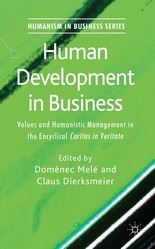Legal tip 842. Human development in Business
Friday, October 19, 2012 @ 2:21 PM
Human Development in Business

Publisher: Palgrave Macmillan
Original document:Human Development in Business
Year: 2012
Language: English
The book is divided into two sections, the first of which offers philosophical reflections on business and its impact on society.
Claus Dierksmeier examines why human freedom and morality have been stripped away from modern economic teaching. He then goes on to explain how freedom-based economic thought can pave the way for more and better corporate responsibility.
Domènec Melé discusses "first person" ethics as the cornerstone for economic activity, while Francesc Torralba and Cristian Palazzi explore "the logic of gift" -- i.e., looking beyond profit and promoting the human good -- in contrast with commercial logic, broadening the traditional concept of economic rationality.
Also included is a comparison by Paul H. Dembinski of two distinct forms of social, financial and economic interaction: relational and transactional.
Ethics professor Michael Assländer, meanwhile, weighs in on the reformulation of corporate social responsibility.
Humanistic Management in Practice
The second part of the book takes a practical view toward developing more humanistic management practices.
Robert Kennedy argues that successful businesses must orient themselves toward "gratuitousness," that is, a deep commitment to customers rooted in the spirit of generosity and selfless giving, particularly those who are economically disadvantaged.
Also included is Antonio Argandoña's proposal for a theory of human action that introduces moral virtues in the reasoning of economics and forges new avenues of thought toward love, gift and gratuitousness.
Focusing on the topic of entrepreneurship, André Habisch and Cristian R. Loza Adaui reflect on how entrepreneurial activity has been marked by gratuitousness from medieval times through industrialization.
In addition, Jennifer E. Miller examines work as a vehicle for cultivating creativity and personal growth, the contribution of women, and possible solutions to the challenges faced by working women today.
By taking an interdisciplinary approach rooted in Catholic social teaching, the authors make a significant contribution in the field of management thinking on the challenge of human development in today's globalized business world.
.jpg)

"LAS DUNAS Y LOS FUTUROS PINOS DIFUNTOS", Tarifa, Cadiz, Costa de la Luz, Southern Spain, by Chodaboy, at flickr.com